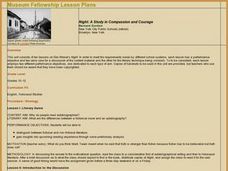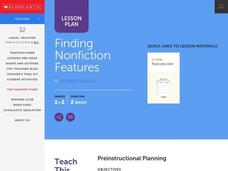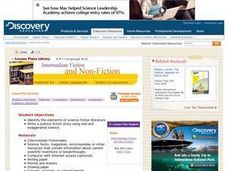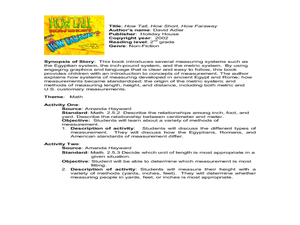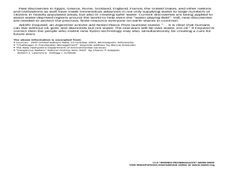Curated OER
Interactive Timeline
Young scholars examine the development of ragtime music and its relation to jazz. They participate in an online Interactive timeline and read about the history of ragtime music, listen to examples of music, and in small groups create...
Curated OER
In the Middle - Middle School Poetry
Students analyze and interpret poems. In this poetry lesson, students are read poems aloud, discuss the meanings in groups, and complete two worksheets after listening to the poems. Links to the worksheets and discussion questions are...
Curated OER
"Night": A Study in Compassion and Courage
Students read the novel, "Night" by Elie Wiesel. Using excerpts from the novel, they complete a performance and literary technique objective. In groups, they finish handouts to give them more information on the Holocaust. They compare...
Curated OER
One Story, Many Tales
Students compare and contrast Cinderella stories. In this folktale lesson, students discuss the attributes of the genre and then read and research different cultural versions of the tale. Students present their findings to their classmates.
Curated OER
The New Fant-"Asia": Contrasting Animated and Live-Action Filmmaking
Learners consider different stories and story-telling techniques of animated and live-action filmmaking, write proposals for animated films, and storyboard individual scenes.
Curated OER
50th Anniversary of Brown v. Board of Education
Students examine a poster of Brown v. Board of Education and discuss what the important details are. They read the story behind the poster and court case. They role play different sections of the case such as the court case or Linda...
Curated OER
Finding Nonfiction Features
Young scholars review the differences between a fiction and non-fiction book. In groups, they use different non-fiction books to identify the eleven features that distinguish it from a fiction book. To end the lesson, they create a...
Curated OER
Science Fiction Literature
Students identify the elements of science fiction literature. They write and illustrate a science fiction story using real and exaggerated science. In addition, they read their stories aloud in small groups.
Curated OER
Art of Ancient Civilizations
By studying the art of ancient civilizations, students can learn about the history and traditions of different cultures.
Curated OER
The Experience of the Child Laborer
Students make discoveries about the child laborer through a selection of readings. They make connections between the website readings of the child laborers' personal stories and the images that they saw in the previous lesson.
Curated OER
How Tall, How Short, How Faraway
Second graders determine the correct unit of measure to use for different situations. In this measuring lesson, 2nd graders are introduced to different unit of measure. Students study the origin of measurement and practice measuring....
Curated OER
What Can I Write About When I Can't Think of Anything To Write About?
Third graders write, illustrate, and publish a collaborative story. In this writing lesson, 3rd graders review story elements by reading stories written by professional authors and other students. They work in groups to write a...
Curated OER
Poetry-The Essence of Life
Students analyze and appreciate various types of poetry. In this poetry unit, students read classic and contemporary works to discover ways in which poetry expresses strong feelings. Students identify key vocabulary used to analyze...
Curated OER
Humans and the Natural World Poetically
Students read poetry for gist and find images to create a visual narrative. In this poetry lesson, students read Green Lane and Flies and Nettles to examine the relationship between humanity and the nature. Students reflect on a place...
Curated OER
Poet Naomi Shihab Nye
Students read and analyze poetry by Naomi Shihab Nye. They define stereotypes, view and discuss a video interview with Nye, present an oral reading of a poem, and write a persuasive letter to an author.
Curated OER
Poetry In Motion
Fourth graders read and analyze poetry and examine the process of writing poetry. They read and analyze the poem "From a Railway Carriage" by Robert Louis Stevenson, and answer comprehension questions. They identify the similes,...
Curated OER
When I Was Young in Brooklyn
Students identify various techniques used in memoirs. They reflect on similarities and differences betwee two authors. Students define the term memior. They write about various techiques they noticed the authors used. Students write...
Curated OER
Rainforest Pamphlet
Students read The Kapok Tree and write about the story. In this rainforest story, students write a book in the genre of The Kapok Tree. Students research their animals on the Internet and find facts about the importance of rainforest...
Curated OER
Shoes from Grandpa Lesson Plan
Students read a cumulative text. In this Shoes from Grandpa lesson plan, students examine language usage, different media sources, and literary devices.
Curated OER
Hydro-Technology
Students create a design for water collection, sanitation, or supply. In this hydro-technology lesson, students learn about the global water crisis. Groups of students read water technology articles, draw or design a device or process,...
Curated OER
Tall Tales Today
Students explore the attributes of American tall tales. In this folklore lesson, students read several tall tales, describe the elements of tall tales, and then use hyperbole to write their own tall tales.
Curated OER
Health Grade 5
Fifth graders understand conflict and how to solve them. In this lesson about conflict resolution, 5th graders explore different factors that cause conflict. Students are put into groups and develop a list of examples for a specific kind...
Curated OER
A Nation Divided
Fifth graders participate in various activities related to the Civil War. In this Civil War lesson students understand the events and feelings of people during the Civil War by studying primary sources, journal writing, readings, viewing...
Curated OER
Satire in Fiction
Twelfth graders identify satire in various fictional texts. For this language arts lesson, 12th graders will learn to define satire, parody, and caricature. Students will identify different forms of satire in historical and modern-day...




